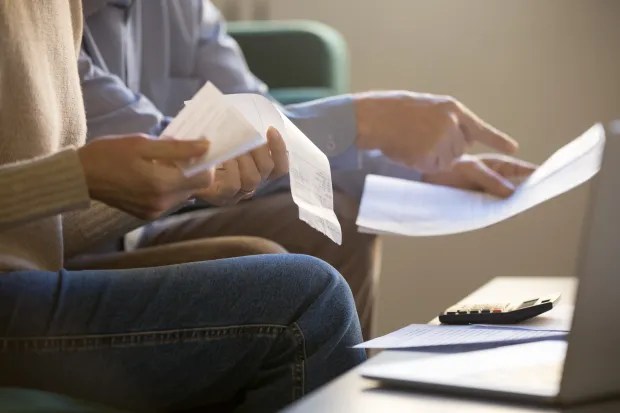MORE than 7.4million people across the UK are struggling with bills and credit repayments.
But fear not, even if the cost of living is taking its toll on you, there are some things you can do to get help with your bills.
Research from The Financial Conduct Authority has found that single adults with children and people living in the north east of England are among those feeling the financial strain.
The data collected shows that one in seven (7.4million people across the UK) adults felt heavily burdened when trying to keep up with their financial commitments in January 2024.
Adults from a minority ethnic background, unemployed adults, people on long-term sick and full-time carers were also more likely to be struggling.
However, as bleak as this sounds it is still a slight improvement on the 2023 figures when the research showed one in five (10.9 million people) were struggling in January 2023.
Read more on Money
This compares to the 5.8million people who were struggling in February 2020, before the cost of living squeeze started.
The most commonly missed bills were utility bills, followed by credit card bills and council tax payments.
If you are finding it hard to keep up with your household bills there is some help out there.
The most important thing to remember is not to bury your head in the sand and ignore mounting debts as it will only make the situation worse in the long run.
Most read in Money
There are several organisations you can reach out to for debt help and advice.
You might even find that you are entitled to claim some kind of support towards your household bills.
What help is out there?
The research showed that one in 20 (5% of mortgage holders) had missed paying domestic bills or credit commitments in the previous six months.
If you are struggling to meet your monthly outgoings you should talk to your lender for advice.
Simply talking to your lender about potential options will not affect your credit score.
There is also a government-backed MoneyHelper website that has tools and tips, while other debt charities can also provide support.
Also, Citizens Advice is a national organisation with more than 20,000 volunteers who can help with everything.
It can help you to find out what benefits you are entitled to and what’s more, the service is provided completely free of charge.
You can find your nearest branch using the tool on its website, or you can contact them by phone on 0800 133 8848.
StepChange is another free advice service offering support and guidance to help you take control of your money.
Organisations offering debt advice
THERE are a number of organisations you can turn to if you are struggling to keep up with the cost of living.
- MoneyHelper website
- Citizens Advice – 0800 133 8848 or online
- Stepchange – 0800 138 111 or online
- National Debtline – 0808 808 4000 or online
- Debt Advice Foundation – 0800 043 4050
You can do it online or over the phone, and it’s completely confidential.
It can talk you through different options such as debt management plans (DMP), individual voluntary arrangements (IVA), bankruptcy, and debt relief orders (DRO) if they are appropriate.
You can start the process using its website or app.
If you are worried you could also contact the National Debtline.
It is a charity offering free and confidential advice to people in England, Wales and Scotland.
You can contact it online or over the phone on 0808 808 4000, between 9am and 8pm Monday to Friday, and 9.30am to 1pm on Saturdays.
An adviser will ask you about your income and spending, so try and have as much information to hand as possible when you call.
Free benefit calculators
A benefit calculator can help you work if you might be entitled to extra cash.
There are several free online benefit calculators that you can use to see how much you might be able to claim and via which benefit.
Some of the benefits that people regularly don’t claim include Universal Credit, pensions credit and child credit.
It is easy to miss out on payments you never knew existed, or never considered that you’d be eligible for.
Around 15,000 people could be up to £7,000 a year better off a year after checking their entitlements, according to Christians Against Poverty (CAP).
Before using the tools, make sure you have key financial information to hand, such as bank and savings statements, and information on pensions and existing benefits.
If you live with a partner or family, get their basic financial information together too as this could affect your claim.
Once you’ve used the tools you can use the contact information on Gov.uk to get the ball rolling and apply for what you’re owed.
Free benefit calculator
THERE are several free benefit calculators that can help you find out if you are entitled to claim.
National Debtline also recommends contacting organisations such as Mind, Samaritans and Anxiety UK if debt worries are affecting your mental health.
The report also found that in the 12 months to January, due to the rising cost of living, 43% (around 22.7million) of adults suffered anxiety or stress.
Also in the year to January, most people (77% or an estimated 40.5 million) spent less or worked more to make ends meet.
What cash might I be eligible for?
In terms of cash help, there are several options and they vary depending on your circumstances.
The government’s Household Support Fund (HSF) is a pot of money that is shared with local councils across the country to help those in need.
Each local authority gets a different portion of funding depending on the size of the catchment area, population, and number of vulnerable households.
The voucher or grant amounts vary by location, so you must check to see what you can get and how your council will pay you
For example, thousands of residents in the London Borough of Tower Hamlets are in line to receive £100 supermarket vouchers in the coming weeks.
To get the help, you’ll need to check with your council – as local authorities are in charge of distributing the funding.
To find your local council, use the gov.uk council finder tool.
If you don’t qualify for the Household Support Fund in your local area you may still be entitled to additional support.
A Discretionary Housing Payment (DHP) is money from your council to help if you’re struggling to pay for rent.
Anyone claiming housing benefit or the housing element of Universal Credit could qualify.
But what you could be entitled to depends on where you live as each local authority decides how much to dish out.
READ MORE SUN STORIES
We’ve rounded up everything you need to know about who can get the cash and how to claim.
Meanwhile, there is a huge change coming for half a million on benefits this year and you should be aware of a key date or risk losing thousands of pounds.
How to cut the cost of your debt
IF you’re in large amounts of debt it can be really worrying. Here are some tips from Citizens Advice on how you can take action.
Check your bank balance on a regular basis – knowing your spending patterns is the first step to managing your money
Work out your budget – by writing down your income and taking away your essential bills such as food and transport
If you have money left over, plan in advance what else you’ll spend or save. If you don’t, look at ways to cut your costs
Pay off more than the minimum – If you’ve got credit card debts aim to pay off more than the minimum amount on your credit card each month to bring down your bill quicker
Pay your most expensive credit card sooner – If you have more than one credit card and can’t pay them off in full each month, prioritise the most expensive card (the one with the highest interest rate)
Prioritise your debts – If you’ve got several debts and you can’t afford to pay them all it’s important to prioritise them
Your rent, mortgage, council tax and energy bills should be paid first because the consequences can be more serious if you don’t pay
Get advice – If you’re struggling to pay your debts month after month it’s important you get advice as soon as possible, before they build up even further
Groups like Citizens Advice and National Debtline can help you prioritise and negotiate with your creditors to offer you more affordable repayment plans
Do you have a money problem that needs sorting? Get in touch by emailing [email protected].
Plus, you can join our Sun Money Chats and Tips Facebook group to share your tips and stories
This post first appeared on thesun.co.uk









